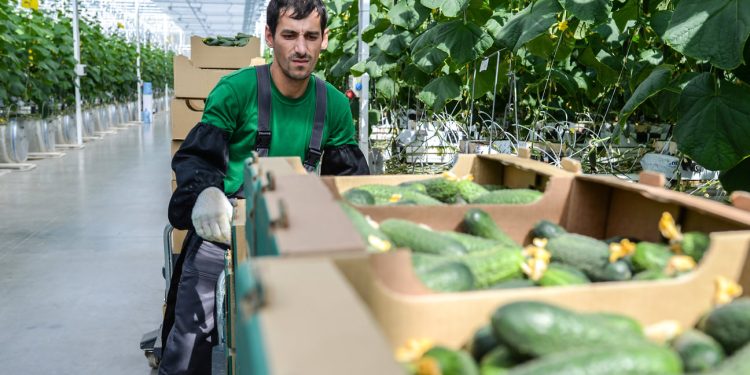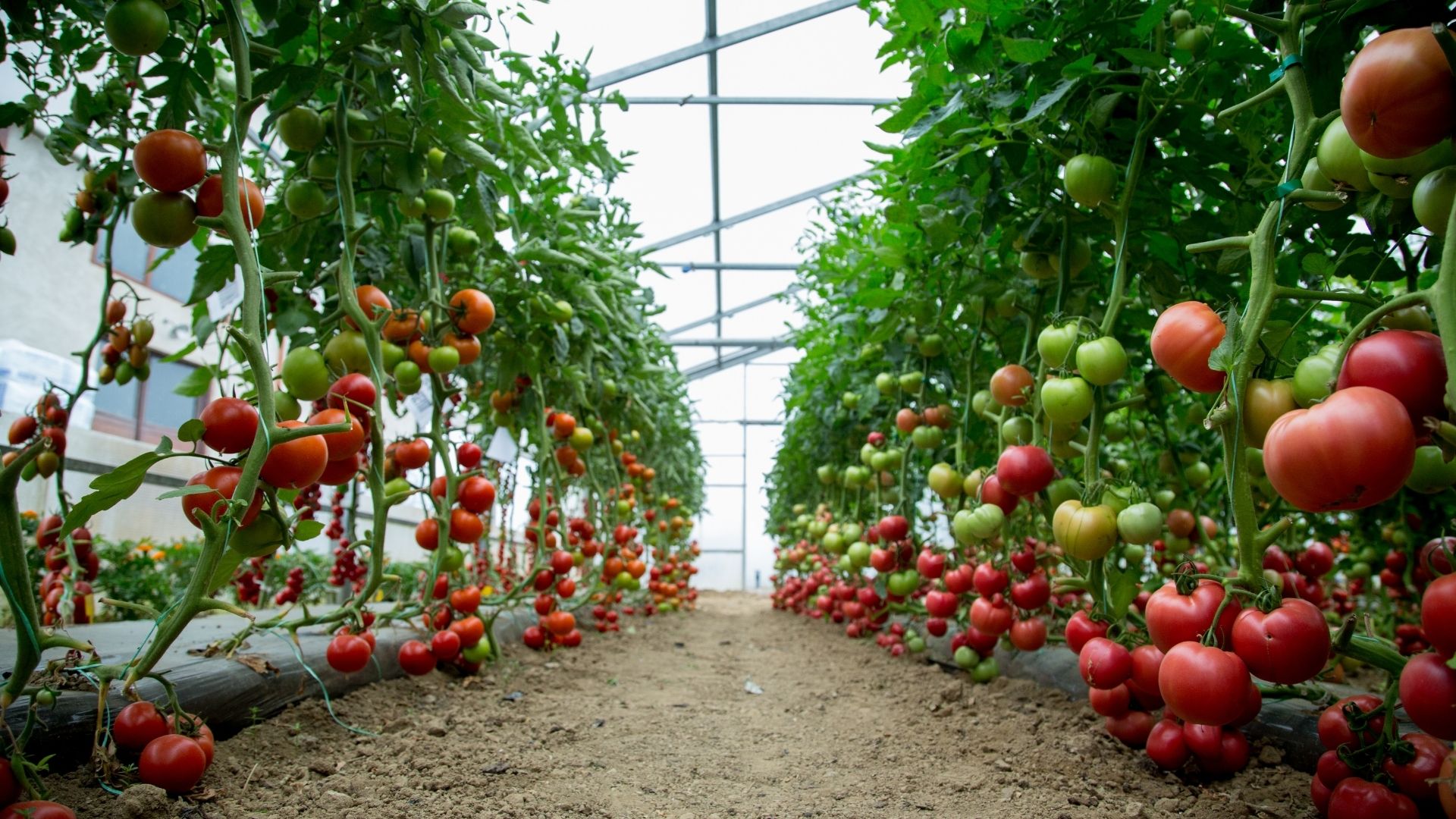Krasnodar Krai is one of the three leading regions in the production of vegetable products of protected soil. However, the share of the imported component in greenhouse production remains high. The rise in the cost of raw materials, spare parts for equipment and logistics, associated with the sanctions pressure on Russia, led to an increase in the cost of vegetables and a decrease in the marginality of the business of Kuban farmers. Market participants argue that agribusiness needs state support to maintain operational processes.
Growth in volumes and technologies
The gross harvest of vegetables of the closed ground of agricultural organizations of the Krasnodar Territory, which are not related to small businesses, in January—October 2022 amounted to 88.6 thousand tons. This is almost 3 thousand tons more than in the same period last year. This was reported to Kommersant-Kuban in Krasnodarstat.
According to the regional Ministry of Agriculture and Processing Industry, Kuban is one of the three leading regions in the collection of greenhouse vegetables together with the Moscow and Lipetsk regions. In the Krasnodar Territory, the production of vegetable products of protected soil is more than 16 kg per inhabitant at a rate of 12 kg. The production plan in 2022 is 112 thousand tons.
“Stable production volume is provided by the expansion of the greenhouse area and an increase in output per unit of used area, which is achieved by the introduction of new technologies for growing vegetables in protected soil, as well as the use of high-yielding varieties. In the coming years, according to forecasts of industry experts, the production of greenhouse vegetables in the Kuban may grow to 130-140 thousand tons. This is due to the revival of investment activity aimed at the implementation of projects for the construction of new high—tech greenhouse complexes,” Fedor Dereka, Minister of Agriculture and Processing Industry of the Krasnodar Territory, tells Kommersant-Kuban.
In the coming years, according to forecasts of industry experts, the production of greenhouse vegetables in the Kuban may grow to 130-140 thousand tons.
According to the regional Ministry of Agriculture, 11 industrial high-tech greenhouse complexes with a total area of more than 240 hectares are operating in the Kuban. They account for 96% of the total volume of greenhouse vegetables in the region. The leaders in the production of protected ground vegetables are Dinskoy, Belorechensky, Timashevsky, Krasnoarmeysky, Seversky districts and Krasnodar. “It is here that the largest greenhouse complexes of the region with the most advanced production technologies are concentrated. On many technological equipment allows you to get more than 70 kg of vegetables per square meter,” the press service of the department reports.
Thus, one of the largest greenhouse complexes in Russia “Green Line”, owned by the retail chain “Magnet”, is located in the Dinsky and Tikhoretsky districts of the Krasnodar Territory. “This year we expect to get more harvest due to the expansion of production capacities — about 58 thousand tons of cucumbers and tomatoes of various types, including cherry and cocktail tomatoes, on which we place great emphasis due to the popularity of the positions,” the company’s press service says.
Greenhouse vegetables in just 20 years have turned from rarely consumed seasonal food products into an everyday part of the diet of Russians. “The active development of greenhouse vegetable growing in Russia began after the introduction of the food embargo in 2014. Before that, about a million tons of vegetables were imported annually from Turkey, Iran and other countries,” says Yulia Tulupnikova, senior lecturer at the Department of Economic Theory and World Economy at Synergy University.
All attention to cucumbers
The trend of recent years has been the expansion of the list of vegetable crops grown in protected soil, the press service of the regional Ministry of Agriculture notes. If earlier it was traditional tomatoes and cucumbers, today it is pepper, eggplant, salads, greens. The percentage of greenhouse vegetables grown has also changed.
“If five years ago cucumbers accounted for up to 70% of the total production, today this figure is 50%. The remaining amount falls on tomatoes — 48%, green crops, and pepper — 2%. Experts attribute the increase in tomato production to a change in the structure of demand for vegetable products of the closed ground. In particular, the demand for domestic tomatoes has increased, especially cherry tomatoes,” the press service of the department says.
Vice-president of the association “Greenhouses of Russia” Andrey Medvedev claims that at the moment there is a high overstocking of the market with cucumbers. This is explained by the fact that cucumber is the fastest growing and quickly recouped product. “Moreover, almost all producers grow one type of cucumbers. You will not see more selective types of products anywhere,” Mr. Medvedev reports. He adds that import substitution has not been carried out for tomatoes in the region, since tomatoes are longer, more difficult and more expensive to grow.
“Peppers, eggplants and other vegetables are not paid attention at all. Entrepreneurs do not want to delay in their business the payment of long-term loans that are necessary for the cultivation of these crops. All this requires stimulation, motivation from the state, and at the moment there is none,” says Andrey Medvedev.
Natalia Davydenko, Head of the Crop and Mushroom Growing department at Interagro, said that 70% of the sweet peppers consumed by Russians are imported at the IV Agricultural Forum “Fruits and Vegetables of Russia — 2022”, held in Sochi at the end of October. Basically, sweet peppers are brought, according to her, from Israel, Turkey and China. Ms. Davydenko is sure that it is quite possible to replace the import of this crop with its own production, but for this it is necessary to solve a number of tasks.
“Pepper is grown in open and closed ground, and the yield differs significantly. For Russia, the cultivation of sweet pepper culture in greenhouses is more suitable. However, production is constrained by agrotechnical (high labor costs and conditionally low yields in greenhouse production; lack of intensive technologies of agricultural machinery, machines for fur harvesting and lines for processing and packaging) and socio-economic factors (lack of culture of constant consumption and high price compared to other vegetables),”— said Ms. Davydenko.
Sanctions hit margins
Under the conditions of sanctions pressure on Russia, manufacturers are faced with rising prices for production materials, the need to look for new suppliers and an alternative to the raw materials and materials that are leaving the Russian market, as well as the need to change the delivery dates, Yulia Tulupnikova states. “Small businesses and farms have the hardest time,” she says.
Difficulties arise primarily due to the high share of the imported component in the production of greenhouse vegetables. Thus, according to Andrey Medvedev, almost 80% of seeds, 60% of plant protection products, 70% of bumblebees for pollination are foreign. Components for equipment used in crop production, in particular for gas-piston installations for generating electric energy, climate control equipment, sorting and packaging equipment, have become expensive and difficult to access.
The same is said in the press service of the retail chain “Magnet”. “This year we had difficulties with the purchase of seeds, fertilizers, plant biosecurity, spare parts. We solve them by developing and expanding cooperation with domestic suppliers, as well as building alternative supply channels,” the company says.
The increase in the cost of raw materials, production materials, transportation significantly increased the costs of farmers, which affected the cost of production.
“At the same time, due to a good harvest, the increase in vegetable prices is almost imperceptible. Let’s say tomatoes cost about the same today as last year,” Yulia Tulupnikova comments. As a result, the marginality of greenhouse vegetable production has significantly decreased in 2022.
Vegetables need support
The production of greenhouse vegetables in Russia is steadily growing. “If the positive dynamics continues, then by the end of 2022 the harvest will be about 1.5 million tons, which is 7% more than in 2021, and this will update last year’s record. The increase in production volumes is achieved both due to the introduction of new areas, and due to the increase in yields,” Yulia Tulupnikova predicts. She adds that in the Krasnodar Territory, vegetable production has increased by a third over the past five years.
There are all conditions for growing greenhouse vegetables in the Kuban, says Maria Zakatova, an analyst at the research company NTech. “This is both a favorable climate and fertile soils. In addition, there are subsidies from the state in the form of reimbursement of funds for the construction of greenhouses for growing vegetables of protected soil, which compensate up to 25% of the construction cost,” says Ms. Zakatova.
For the further development of the industry, according to experts, it is necessary to modernize the greenhouse complexes of the region, the use of highly efficient heating systems, as well as support for small and medium-sized agricultural farms.
“There are subsidized loans, there are installments, there is even compensation for part of the electricity costs when using artificial lighting in greenhouses. There are many measures, but they are not targeted by the type of product,” says Andrey Medvedev. He clarifies that farmers today do not have enough borrowed resources to support operational activities. “It is necessary to stimulate not only the construction of greenhouses, as it is done today, but also the process of growing a wide range of vegetables. State support is not selective. It does not stimulate the cultivation of certain types of products, which are not enough in the country,” emphasizes Mr. Medvedev.
By the way, the association “Greenhouses of Russia” in March appealed to the Prime Minister of the Russian Federation Mikhail Mishustin with a proposal for a number of necessary, in the opinion of farmers, measures of state support. In particular, this is an increase in the limit of preferential short-term lending to 1.5 billion rubles, an increase in compensation to credit institutions for preferential short-term and investment loans to 100% of the key rate of the Central Bank of the Russian Federation; establishment of credit holidays for a period of 1 year to repay investment loans while maintaining preferential rates, compensation for part of the costs of purchasing raw materials, works and services, taking into account the currency component, etc.
The press service of the Magnit retail chain adds that the successful production of greenhouse vegetables, among other things, depends on the development of such areas as breeding and seed production, as well as active work with agricultural universities in terms of integrating scientific knowledge into practical activities.
In addition, the company notes a shortage of vegetable growers. “The result of the greenhouse complexes’ work largely depends on the quality and productivity of these employees. In order to close the gap in these specialists, Magnit uses various types of motivation to retain such employees, forms a personnel reserve for specialists and managers, improves working conditions, regularly conducts staff satisfaction surveys, attracts students of KubGAU. For example, competitions are held with the university for the most interesting and effective research for production with the payment of incentives and personal scholarships from the retail chain,” the company says. However, the problem, according to experts, remains systemic for the industry and requires the attention of the state.
Margarita Sinkevich
A source: https://www.kommersant.ru










